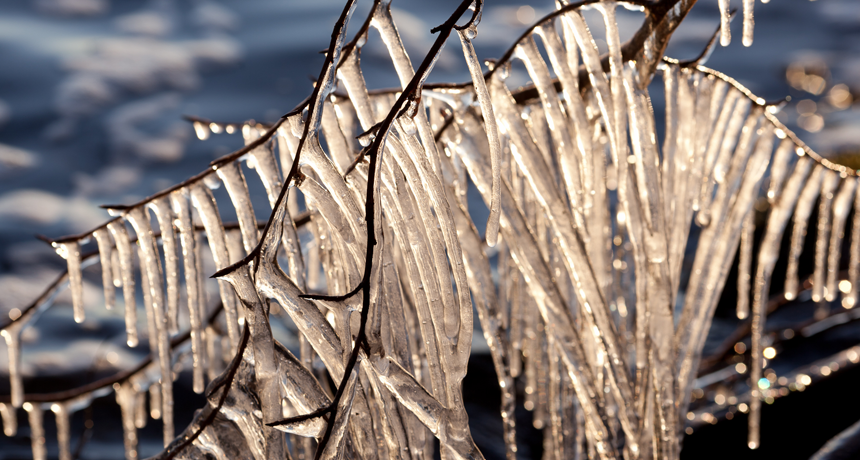Here’s how hot water might freeze faster than cold
Properties of hydrogen bonds may explain the effect — if it even exists

Hot water might freeze faster than cold water under certain conditions, some scientists say. Properties of hydrogen bonds could explain how this happens. But not all scientists agree that the effect is even real.
Harald Hoyer/Wikimedia Commons (CC-BY-SA 2.0)
Cold water should freeze faster than hot water. Right? It seems logical. But some experiments have suggested that under the right conditions, hot water can freeze faster than cold. Now chemists offer a new explanation for how this might happen.
What they don’t do, however, is confirm that it actually does occur.
The speedier freezing of hot water is known as the Mpemba effect. If it happens, it would be only under certain conditions. And those conditions would involve the bonds that link up neighboring water molecules. A team of chemists describe these potential unusual freezing properties in a paper published online December 6 in the Journal of Chemical Theory and Computation.
Their paper has not, however, convinced everyone. Some skeptics argue that the effect just isn’t real.
People have described quick-freezing of hot water since the early days of science. Aristotle was a Greek philosopher and scientist. He lived in the 300s B.C. Back then, he reported observing hot water freezing faster than cold water. Fast forward to the 1960s. That’s when a student from the East African nation of Tanzania, Erasto Mpemba, noticed something strange, too. He claimed that his ice cream turned into a solid faster when it was put into the freezer steaming hot. Scientists soon named the quick-freezing hot-water phenomenon for Mpemba.
No one is sure what might cause such an effect, although plenty of researchers have guessed at explanations. One is related to evaporation. That’s the transition of a liquid to a gas. Another has to do with convection currents. Convection occurs when some hotter material in a fluid or gas rises and colder material sinks. Yet another explanation suggests that that gasses or other impurities in water might alter its freezing rate. Still, none of these explanations has won over the general scientific community.
Now along comes Dieter Cremer of Southern Methodist University in Dallas, Texas. This theoretical chemist has used computer models to simulate to actions of atoms and molecules. In a new paper, he and his colleagues propose that chemical linkages — bonds — between water molecules could help explain any Mpemba effect.
Unusual links between the water molecules?
Hydrogen bonds are links that can form between hydrogen atoms of one molecule and the oxygen atom of a neighboring water molecule. Cremer’s group studied the strengths of these bonds. To do that they used a computer program that simulated how water molecules would cluster.
As water warms, Cremer notes, “We see that hydrogen bonds change.” The strength of these bonds can differ based on how the nearby water molecules are arranged. In simulations of cold water, both weak and strong hydrogen bonds develop. But at higher temperatures, the model predicts that a bigger share of the hydrogen bonds will be strong. It seems, Cremer says, “The weaker ones are broken to a large extent.”
His team realized that its new understanding of hydrogen bonds might explain the Mpemba effect. As water is warmed, weaker bonds would break. This would cause big clusters of these linked molecules to fragment into smaller clusters. Those fragments might realign to form tiny ice crystals. They could then serve as starting points for the bulk freezing to proceed. For cold water to rearrange in this way, weak hydrogen bonds would first have to break.
“The analysis in the paper is very well done,” says William Goddard. He is a chemist at the California Institute of Technology in Pasadena. But, he adds: “The big question is, ‘Does it actually relate directly to the Mpemba effect?’”
Cremer’s group noted an effect that might trigger the phenomenon, he says. But those scientists didn’t simulate the actual freezing process. They didn’t demonstrate that it happens faster when the new hydrogen bonding insights are included. Simply put, Goddard explains, the new study “doesn’t actually make the final connection.”
Somel scientists have a bigger concern with the new study. Among them is Jonathan Katz. A physicist, he works at Washington University in St. Louis. The idea that warm water might freeze faster than cold water “just makes absolutely no sense,” he says. In Mpemba experiments, the water freezes over a period of minutes or hours. As the temperature drops over that period of time, weak hydrogen bonds would reform and molecules would rearrange, Katz argues.
Other researchers also are debating whether the Mpemba effect exists. Scientists have struggled to produce the effect in a repeatable way. For example, one group of scientists measured the time for hot and cold samples of water to cool to zero degrees Celsius (32 degrees Fahrenheit). “No matter what we did, we could not observe anything akin to the Mpemba effect,” says Henry Burridge. He is an engineer at Imperial College London in England. He and colleagues published their results November 24 in Scientific Reports.
But their study “excluded a very important aspect of the phenomenon,” says Nikola Bregović. He is a chemist at the University of Zagreb in Croatia. He says Burridge’s study observed only the time to reach the temperature at which water freezes. It did not observe the initiation of freezing itself. And, he points out, the process of freezing is complex and hard to control. That is one reason the Mpemba effect has been so hard to investigate. But, he adds, “I am still convinced that hot water can freeze more quickly than cold water.”







